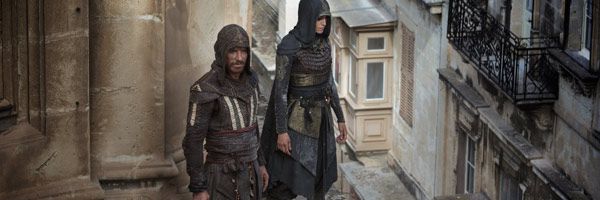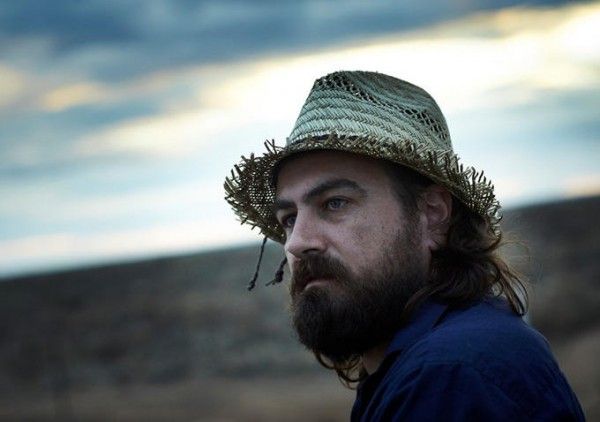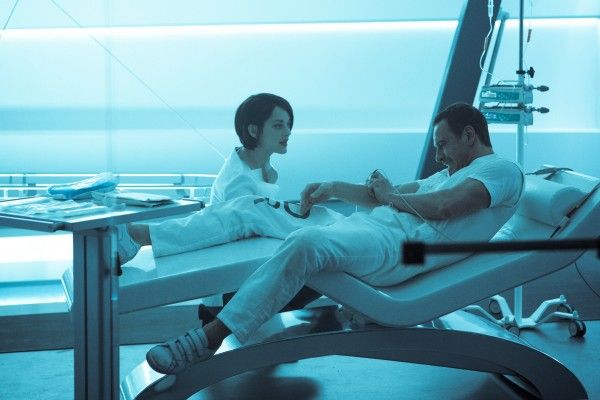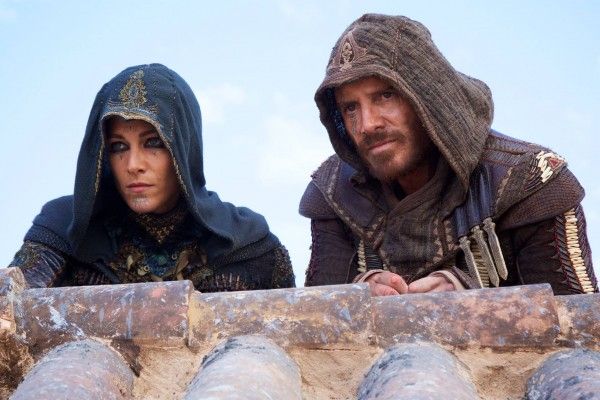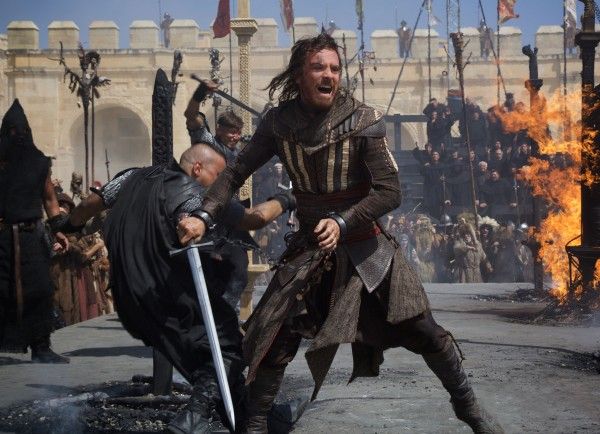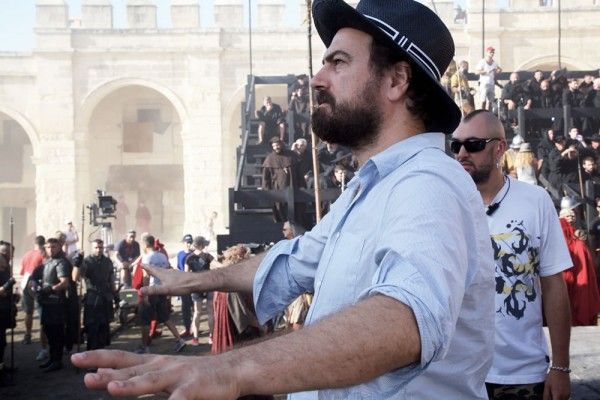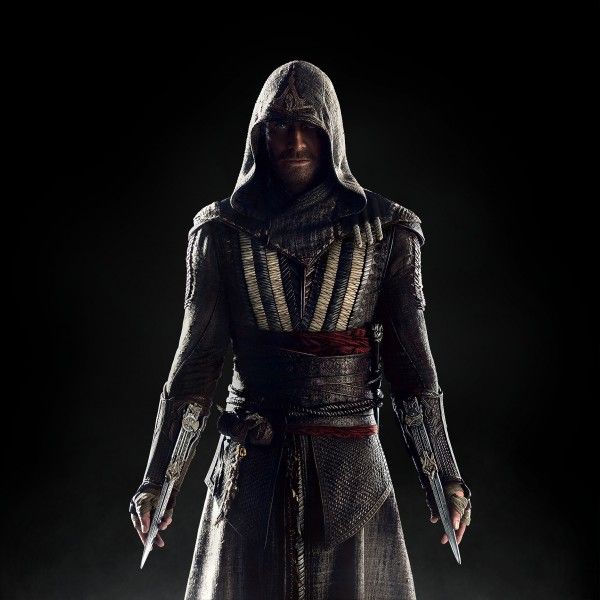When it comes to making a potentially franchise-starting adaptation of an immensely popular video game series, the director of the unrelentingly bleak true-life drama Snowtown Murders doesn’t immediately come to mind. But as Ubisoft and 20th Century Fox starting rolling forward on their Assassin’s Creed movie, that’s exactly who they went for, setting Justin Kurzel to take the helm of this incredibly ambitious film. Of course it helped that Kurzel had just worked with producer/star Michael Fassbender on the haunting Macbeth, but the hiring of this particular filmmaker signaled that Assassin’s Creed has the potential to be something very, very different from your standard franchise play.
Last fall, I got to visit the London set of Assassin’s Creed along with a small group of reporters, and during our trip we had the pleasure of sitting down with Kurzel to discuss the film. The director talked about embarking on his biggest project by far, satisfying both fans of the game and folks who know nothing about Assassin’s Creed, and maintaining a strong focus on practical effects and location shooting over relying on CG. Kurzel also discussed his third collaboration with cinematographer Adam Arkapaw—who was responsible for that incredible tracking shot in True Detective Season 1—and how the two aim to capture the fight sequences in Assassin’s Creed with plenty of long takes and few cuts.
From our discussion with Kurzel it was clear that he had a really strong handle on what kind of movie he wanted to make, with a unique vision for highlighting the action sequences and freerunning that are hallmarks of the games. Visually, the film sounds like it’s going to be a real treat, and if Kurzel can accomplish what he’s setting out to do in terms of marrying themes with blockbuster filmmaking, the result could be something special.
Check out the full interview below, and for more of my set visit coverage, click the corresponding links. Assassin’s Creed opens in theaters on December 21st.
- 'Assassin's Creed': 33 Things to Know About the Ambitious Video Game Adaptation
- 'Assassin's Creed': Michael Fassbender on the New Animus and How the Franchise Is Like 'Star Wars'
What's it like, day 40 of an 80 day shoot? How are you feeling so far?
JUSTIN KURZEL: I feel like I've got my second wind. I've never shot for this long. Macbeth was seven weeks, and Snowtown was like five weeks. I feel like I've made two feature films already. It's been a pretty extraordinary experience working with the scout.
What’s the experience like working with such a big budget?
KURZEL: Well, it's all relative. You never have enough money, and you've always got the same challenges. I think it's very similar. It's a very similar process to working with Snowtown and Macbeth. It's all relative to what you're doing and the ambitions you have and they're always greater than what the resources are around you. Especially with this one, we're trying to do as much as possible in camera. We've gone and shot in rural locations and I was kind of determined not for this film to be a car park film, where you’re shooting just in green screen and your using most of post to help you out. It's been really important, also just to differentiate ourselves from the game as well in terms of timing. The wonderful thing about cinema is you can bring a 3D world to life. It was important that it had its own tone and it had its own kind of dance to it that is embracing the DNA of the game, but it’s also offering up something different, which is what cinema can do, especially if you film in the real places.
What were the main themes of the game that you tried to bring into the film?
KURZEL: For me, Assassin's Creed has always been about tribe, about belonging to something. Definitely, this story is an origin story, about a man who discovers that he's an Assassin and that he's not alone and that in him he has a blood that runs very, very deep. Those themes and ideas are really kind of fascinating. The idea that you’re made up of the people that come before you and you somehow have some kind of conscious dialog with your genetics. I think it's really deep and interesting stuff. I think it's probably why the game's so popular. There's a context to the game that's smart and sophisticated, but also very contemporary.
Can you talk about the action in the film, like how you guys are approaching this to make it, maybe slightly different than other films that are out there right now?
KURZEL: We're trying not to cut a lot. We're trying to shoot the action in camera and try to work with the best stunt people. We've got some of the best parkour guys in the world at the moment. We're just trying not to cheat as much. I think that, some of these films, you can get away with creating an action sequence with continuous cuts. I think we're trying to, I guess, in an old school way, allow action to play out, and for you to be engaged with the action that's in front of and the sequences that are in front of you before you're cutting into them. That takes a lot of time and a lot of discipline ... Trying to use the actors as much as possible so that they're involved and engaged. Just trying to do it in a very honest and grounded kind of way.
You just adapted Shakespeare and now you're adapting a video game. I'm just wondering if it's a similar process of adaptation? Do you look at them for visual references or was it a similar experience in making both films, in that regard?
KURZEL: What is similar, like Macbeth, is the thousands of productions of Macbeths that we've all seen and been involved in and read in bad school productions ... Then, also, the extraordinary films of Macbeth, there's a kind of baggage that comes with that, like there is a massive baggage that comes with Assassin's Creed. A product that is adored and loved. You have to have a dialog with that. At the same time, we are also trying to make a film, too, that engages with people who are not familiar with the game. Also, kind of brings a new audience to some of the themes and the ideas that people might be naive to.
I think doing a piece of cinema allows you to investigate things in a different way, such as narrative and storytelling, and then subtly bringing words and faces to these characters in the game that we have the privilege of doing, which you obviously can't in the game so much because they're made up. That's been really exciting is sort of bringing a life, a very visceral and real life to some of these characters.
Michael says he's been involved with this project for about 4 years now. You came on about a year ago. I know with a lot of your other features you wrote them, aside from Macbeth, obviously. Was it interesting for you to come on board a project that had kind of already had a lot of development and a lot of things already in progress, sort of join in a stage where you're not creating it right from scratch?
KURZEL: Yeah, there's been quite a few voices involved in this. Obviously, through the studio, but then also Ubisoft, and then Mike, who has been heavily, heavily involved. It's been really about kind of focusing the storytelling. That's something I really love and enjoy. That really comes from when you start to kind of go into pre-pre and start to work out what you can achieve and what's starting to be the highlighted themes of it. It's been quite a similar process to the other projects. Probably more, what's been the involvement with Michael, and the intimacy in pre was very different from Macbeth, which obviously was already there and we kind of developed that.
As a storyteller, I know that obviously this has two different settings. How do you make it all feel of one piece, the science fiction elements as well as the period piece elements?
KURZEL: That's been the most tricky thing. They both are very, very distinct, especially in the game. You do probably spend more time in the past in the game. The present settings are really kind of transient settings pieces to get you into the past. I guess in terms of setting up the film, we do spend probably, predominantly, a little bit more time in the present, setting up the lead character in Cal, and getting the audience to know him and understand him. I think it's about how those worlds bleed. Obviously in the game there's the bleeding effect and there's the idea that the shadows of the regressions start to play out in the present world, and you’re starting to see your past ancestor. The idea that that history becomes a ghost within the present.
Also, you see within the set, with the Animus is sort of built in this kind of byzantine Templar church that Abstergo have kind of built around it. It's almost like an old Templar church. We've kind of decided to combine the old and the new within the actual production design, where you feel the history of the Templars, playing a space like this. We're continuously just trying to find ways in which there's a bridge between those two worlds. At the same time, there's something very exciting about going between two different palettes. The past feels very, like a Caravaggio painting. It's very rich and very seductive, like the game. The light in the game is just extraordinary. There's a romance to the history that we really didn't want to lose, contrasted with this very sophisticated, architectural, heavy designed world with modern day templates. I think it's a mixture, but at the same time embracing the contrast.
In addition to working with Michael Fassbender again, you’re working with Adam Arkapaw again as DP. What does someone like Adam bring to a project like this?
KURZEL: Just an incredible artistry. I'm very lucky to have met him at film school and developed a relationship with him. He is a huge, huge part of my films. I couldn't make the films without him, we both live in each other's pockets. His understanding of light and his understanding of how to tell a story through movement of camera. He's extraordinary with performance. I think after True Detective, there's a kind of classic style that he's developed now that ... A very in camera style, that grounds things but at the same time finds a magic to it that we're trying to embrace with this. He's been a huge part of the re-imagining of Assassin's Creed as a piece of cinema.
Did you try to incorporate any of the camera movements from the game? The camera in the game is quite distinct. It's like sometimes it swoops in, sometimes it pulls back. Did you try and incorporate any of that into the film?
KURZEL: I don't think you can ignore the Eagle Vision point of view in the game. I think the notion and the idea of these Assassins having the skills or sensitivity of an eagle and the whole notion of the leap of faith and flight and eagle vision ... There's certain aspects of just the character that we tried to work in to rather than kind of copy certain sequences within the game. Again, it's just been trying to approach it through character.
There's also certain things we can't achieve that the game can because it can go anywhere. I think we've been very conscious about that. We don't want this to be a superhero film, we want it to be a film that embraces what it is to be human. All our jumps and all our parkouring, it has to feel as though you're watching it and thinking, on a good day I could do this. Otherwise I think it goes into a fantasy, which I don't think the game is about. Assassin's Creed is based on real history. They spent a lot of time basing it on real characters. The details are just completely true to the period. It's very important that it feels tangible, the film feels tangible and it feels as though it has existed, but also that it just feels human.
Some would say Adam knows his way around the long take. Are there one or two sequences that you guys have crafted to be a long take here? We know that this set is built to go everywhere.
KURZEL: That's kind of why we built it that way, is to try to keep the takes simple and long and moving. I think the same with the past, just trying to keep long action sequences that are not interrupted by the cuts. As much as possible, and the actors have spent so much time rehearsing the actual kind of moves, we just wanted to make sure that we were embracing the hard work that they've done, and that it felt ... When you look at Michael doing something, it's Michael doing something. It's Michael parkouring or it's Michael having spent 3 weeks learning a certain move. I guess that kind of uninterrupted, sort of longer takes is something that is definitely apparent in Adam's style but it's also something that we've brought into the film.
Was there any one game in particular that was influential for the film?
KURZEL: No, I think they've all got certain qualities. The first game that I played was Unity. There's a kind of romanticism to that game that's very seductive. I think they've all, in their little bits, provided certain kind of points of view, especially through the assassin that we've definitely been inspired by.

